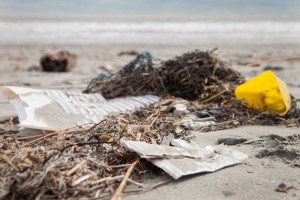
By State Representative Donna Walsh (D- 36) and Jamie Rhodes, Rhode Island Director
The referenced media source is missing and needs to be re-embedded.
This post was first published in the Providence Journal
There are few Rhode Islanders — or visitors to the Ocean State — who haven’t encountered a bottle or plastic bag on their favorite beach or other cozy coastal spot. This debris washed up on the shore because of problems in our recycling and collection system.
In 2011 alone almost 26,000 pounds of garbage were picked up on 101 miles of Rhode Island coastline through just one of the volunteer coastal-cleanup programs. These volunteers diligently comb 420 miles of coastline, spending countless hours each year, working with such groups as Save the Bay, the Audubon Society and Clean Ocean Access. Collecting these tons and tons of marine debris is a thankless job and shows a commendable community spirit. Ditto the rare individuals who patrol the shorelines near where they live.
Trash on our coast is a huge problem for the state, economically and environmentally, not to mention an eyesore on your precious Saturday at the shore. A day at the beach is often not all it is cracked up to be.
On Jan. 29, legislation to take the first steps to reduce marine debris was introduced at the State House. It has the added advantages of improving Rhode Island’s recycling capability and preserving landfill space; reducing the financial burden on taxpayers and municipalities; and cutting down on the wasteful paper and packaging products that stream into the state and ultimately Narragansett Bay.
Up to 80 percent of marine debris is attributable to land-based litter. Of the trash that ends up in our waters, as much as two-thirds originates from the packaging materials that come with food, beverages and other stuff.
The effort to develop a system-wide process that cuts down on the (predominantly) plastic and paper packaging we are so familiar with is complex, but the goal is simple. We need to get the major producers of these products to take a shared responsibility for increased collection and recycling. It will take an industry-wide effort, and there must be a financial commitment from product manufacturers to help take the sole burden of paying for material collection and cleanup efforts off taxpayers.
To date, a few large companies that would take on this responsibility have come to the table to work together with states, localities and public advocacy groups. Most notable is Nestlé Waters North America, which has been a leader in promoting producer responsibility for the products it sells.
This legislation is designed to lay down the rules of the road. All product manufacturers would play by the same rules and help fund the part of the collection and recycling system used for their products. This would help align the needs of the recycling system with those using recycled materials. Instead of paying to collect and recycle packaging as taxpayers, the cost of this system would be folded into the sticker price of the product. The less packaging that a manufacturer uses, the cheaper the product.
There would be a clear benefit to manufacturers as well. One way to think of it is that when we buy a cold drink in a can, we only buy the beverage, but rent the can. The manufacturers get to keep the can because they are providing for even more convenient collection of it, through curbside or away-from-home locations. It is up to you to ensure that the rental gets back into a recycling stream, and for can’s makers to ensure that it is picked up and returned to sender.
Cutting down on marine debris, reducing the amount of packaging materials, taking a tax burden off cities and towns, and enhancing the state’s evolving recycling effort is a hard process. But in a state that treasures its coastal resources and relies on them for economic growth, it must be pursued with shared responsibility.
Donna Walsh, a Rhode Island state representative (D.-Charlestown, New Shoreham, South Kingstown and Westerly), is vice chairwoman of the House Committee on Environment and Natural Resources. Jamie Rhodes is executive director of Clean Water Action Rhode Island.Related Posts
Stay Informed
Get the latest updates and actions:
Thanks for signing up!
There was a problem processing your signup. Please try again.


